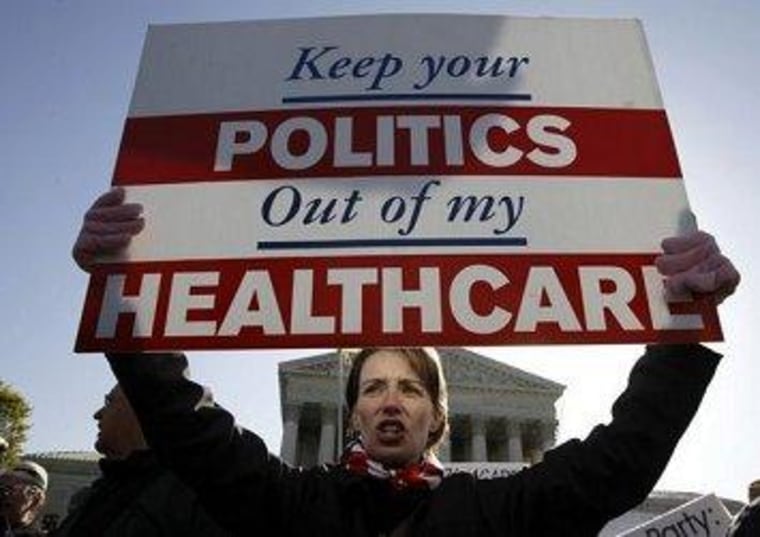Over the last several weeks, there have been competing reports about what, if anything, congressional Republicans will do if the Supreme Court kills the Affordable Care Act. Some reports suggest GOP policymakers, fearing a public backlash, will grudgingly extend some popular consumer protections currently in "Obamacare." Other reports suggest Republicans will simply do nothing.
As of this morning, the latter camp appears to be winning. Politico, citing a "shift" in the GOP strategy, reports today that Republicans won't lift a finger to help families hurt by the demise of the law -- no coverage for young adults; no protections for those with pre-existing conditions; no help for seniors struggling to pay for prescription medication.
If families suffer as a result of the likely high court decision, well, maybe Republicans will think about doing something next year, maybe not.
And this brings us to a big-picture question that received some intermittent attention in 2009, but which hasn't generated much attention since: do Americans have a right to medical care? As Jon Chait explained this week, it's a moral question the parties answer differently.
Several reporters have recently filed dispatches showing in human terms what sort of conditions we would be perpetuating in the event that five Republican Supreme Court Justices, or a potential Republican-run government next year, partially or completely nullify the Affordable Care Act. A man will watch the tumor in his leg grow to the size of a melon, and his wife will sew special pants to fit the growing bulge, because he has no insurance. A woman will hobble around for four years on an untreated broken ankle she can’t have repaired. People will line up in their cars and spend the night in a parking lot queuing for a rare free health clinic.Maybe these stories sound like cheap emotional manipulation. They are actually a clarifying tool to cut through the rhetorical fog surrounding the health-care debate and define the question in the most precise terms.
Quite right. In precise terms, though both major American political parties accept the basic premise of the free-enterprise system -- those with more wealth will, as Chait put it, "enjoy vastly greater comforts and pleasures than others" -- Democrats and Republicans differ on what the consequences should be for those with less.
"What is being disputed is whether the punishments to the losers in the market system should include, in addition to these other things, a denial of access to non-emergency medical treatment. The Republican position is that it should."
This is obviously, painfully, demonstrably true, though it doesn't come up often in polite conversation.
There are basic American institutions that enjoy broad political support. Everyone in the country, regardless of wealth, is entitled to go to a public school. We can go to public libraries. If there's an emergency, we can call the police and/or the fire department. When we're older, we can count on Medicare and Social Security. Up until very recently -- right up until the radicalization of the Republican Party -- these basic observations were uncontroversial elements of American society. They enjoyed the status of consensus.
But if we want to see a doctor, the consensus disappears. Democrats believe you're entitled to seek non-emergency medical care, just as you're entitled to send your kid to school or ask the fire department to put out a fire. Republicans believe the ability to see a doctor is a luxury. They are, as Chait noted, "the only mainstream political party in the advanced world" to believe it's acceptable to deny basic medical care to citizens based on their wealth.
Let that fact roll around in your brain for a moment.
Long-time readers know that I've been writing for years about the ideological shift in GOP politics and the extent to which Republicans oppose the mainstream ideas they used to support. There are competing explanations for this -- some of it varies by issue -- but the shift on health care is of particular interest given this week's developments.
Up until quite recently, President Obama's Affordable Care Act was, for all intents and purposes, the Republican vision on how to reform the health care system -- it's built on pillars such as private insurers, personal responsibility, and deficit reduction. We now know, of course, that Republicans see this identical law as the end of civilization and an "Armageddon" policy.
What's behind the shift? Some of it is political expediency (if Obama supports the law, it must be deemed evil), some of it is ideological (the GOP has moved much further to the right), and some of it is electoral (if Obama gets credit for fixing the broken health care system, he's the FDR of the 21st century) but the unstated crux of the problem is practical.
Republicans proposed Obamacare-like solutions to the health care crisis, but their commitment to their own solution was always superficial, at best. Their argument, in effect, was, "If we're going to do health care reform, we might as well do it in this market-driven way."
But the underlying point is, Republicans didn't really want to do health care reform; they were offering a solution they could tolerate to a problem they didn't want to solve.
As the political winds shifted, and the GOP became a more purely right-wing party, they simply dropped the pretense. Instead of saying, "If we're going to do health care reform, we might as well do it in this market-driven way," the new Republican position is, "Health care reform isn't worth doing at all."
It's exactly why "repeal and replace" was a fiasco -- GOP policymakers never had any intention of replacing the Affordable Care Act with anything, because they don't see a problem with a system in which those with less wealth receive less care.
To overlook this detail is to ignore what makes the larger policy debate such a mess.
